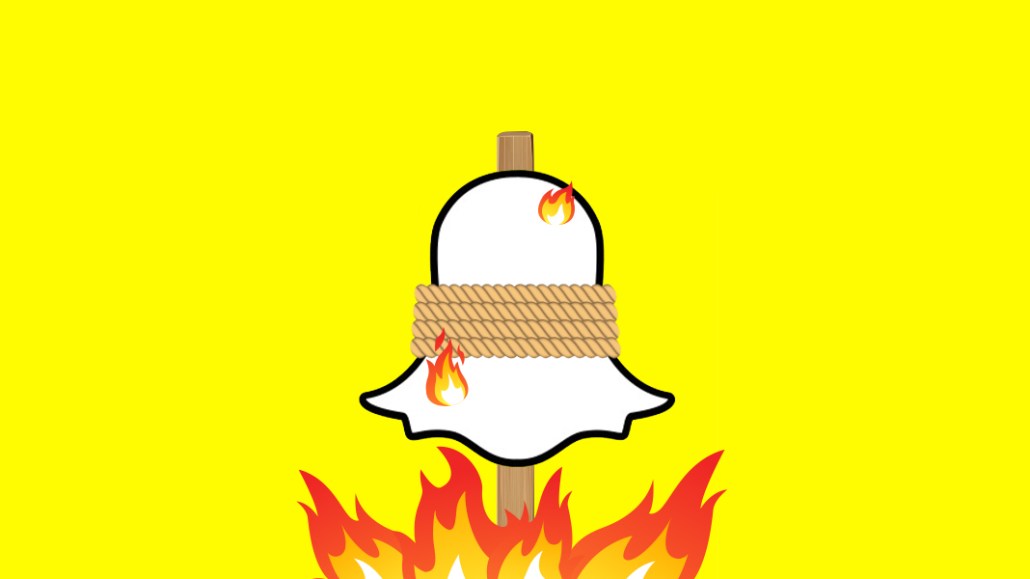
This week’s top stories examined concerns for Snapchat, media agencies’ and brands’ ventures into artificial intelligence and more. As always, a full list of these articles appears at the bottom.
Snapchat faces challenges with earnings and expansion
In the Hype Cycle, the trough of disappointment is an inevitable period. Snapchat parent company Snap reported its first quarterly earnings since its much-hyped IPO. Some key figures:
- 166 million daily users
- $150 million in quarterly revenue
- 90 cents average revenue per user
Don’t forget Europe: Snap faces an uphill climb in its European expansion — specifically in Germany, a company priority. Snap already created lenses for that market, and four media companies have launched as Discover partners, with Spiegel Online and Bild the first homegrown German media houses to join. The company will open a local office in a few months. But growth there won’t be easy, Jess Davies writes.
Reality check: “Snap is surfing a high tide in the U.S. They think the tide is the same here, but it’s not,” said Norman Wagner, managing director of MediaCom Beyond Advertising. “We don’t get any real figures to show reach here.”
The view of an Instant Articles, AMP holdout
Newly rechristened Dotdash (formerly About.com) is reliant on traffic from platforms, Google in particular. But for now, Dotdash is mostly holding out. Dotdash CEO Neil Vogel participated in our first Digiday+ members-only Slack town hall to discuss this (and many other topics.)

AI tools for media buying garner mixed reactions
The robots are coming for all of us, although it’s not yet clear if we’ll be friends or enemies. Dole Asia used an AI platform called Albert for a full digital campaign that included all the buying, optimization and placement.
How it worked: Dole first set KPIs and told Albert what channels and devices to target. Albert then determined what media to invest in at what times and in what formats. It also decided where to spend the brand’s budget and figured out the right combinations for creative and headlines in real time.
The upshot: “It’s going to make people extremely uncomfortable,” said Ashvin Subramanyam, vp of marketing and innovation at Dole Asia. “It’ll rupture media agencies.”
The counter: “AI is not going to rupture media agencies,” said David Gaines, chief planning officer of North American operations for agency Maxus.
Good takes elsewhere:
- The New York Times’ Jim Rutenberg pleads ad buyers to help preserve quality news sources. Good luck with that.
- For Mashable, Jack Morse delves into Mastodon, a social network he says has the potential to take on Twitter.
- Monica Jha investigates selfie deaths in India in a long-form feature for FactorDaily.
This week’s top Digiday stories:
- A cheat sheet on Snap’s first three months as a public company
- ‘We don’t get any real figures’: In risk-averse Germany, Snapchat faces challenges
- Who needs media planners when a tireless robot named Albert can do the job?
- How media agency Maxus is testing artificial intelligence
- How Vice plans to prove to advertisers its branded content works
- Programmatic 101: Marketers turn to tech vendors for ad tech lessons
- Do ad buyers have a moral obligation to save media?
- After Pepsi’s Kendall Jenner debacle, social issue-oriented advertising loses luster
- Now profitable, Patch wants to be a platform for other local news outlets
- Inside the success of Nike’s Breaking2 ‘moonshot’
- ‘A proverbial black box’: Open-exchange auctions have a transparency problem
More in Marketing

YouTube’s upmarket TV push still runs on mid-funnel DNA
YouTube is balancing wanting to be premium TV, the short-form powerhouse and a creator economy engine all at once.

Digiday ranks the best and worst Super Bowl 2026 ads
Now that the dust has settled, it’s time to reflect on the best and worst commercials from Super Bowl 2026.

In the age of AI content, The Super Bowl felt old-fashioned
The Super Bowl is one of the last places where brands are reminded that cultural likeness is easy but shared experience is earned.








